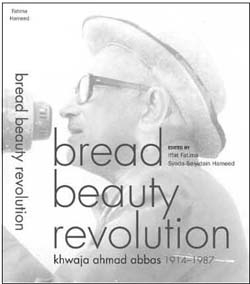Khwaja Ahmed Abbas donned many hats in his lifetime which includes writing poetry, short stories, novels and making films. For the uninitiated, K.A. Abbas was an active member of PWA and one of the founding members of IPTA. With the corpus of 74 books, 40 films, 89 short stories and 3,000 or so from his column writings, Abbas Sahab’s writings constitute a treasure-trove of information on the evolution of the idea of India. At the time of writing one of his last columns for the Blitz, Abbas Sahab makes an important observation about the then budding journalist P. Sainath—the proof of his astute reading of the media in general and politics in particular. Bread Beauty Revolution is a window to his immensely gifted craft of writing, film making and most importantly about the unpacking of a political life which remained critically absorbed in his socio-political surrounding till his death in 1987.
The book traces an individual’s journey born in an illustrious family of social reformers and poets like that of Maulana Altaf Husain Hali. Embedded in this progressive upbringing young Abbas later meets Nehru on a train journey to Aligarh. And it is here that something changes forever for that young man just like it happened to many men of those times. Totally smitten by Nehru’s ideas for the new emergent India, K.A. Abbas’s pen and mind both reflected a new energy. The book successfully portrays a new India unfolding itself in Nehruvian times propelled by the energies of so many young men who had had the collective dream of making the Republic of India a socialist one and more importantly, a secular one at that. It was not for nothing then that the production house that Abbas Sahab founded later was named ‘Naya Sansar’ (New World) whereby he wrote, produced and directed films like Dharti Ke Laal, Anhonee, Shree 420, Jagte Raho, Pardesi, Shehar Aur Sapna, Saat Hindustani, Aasman Mahal, Chaar Dil Char Rahain, Bambai Raat Ki Bahon Mein, Mera Naam Joker, Bobby to name a few.

